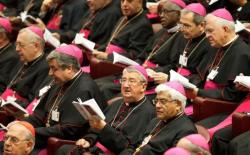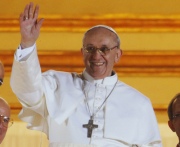 The Extraordinary Synod on the Family concluded over the weekend in Rome (5-19 October, 2014), bookended by the beatification of Pope Paul VI. It proved to be an eventful, even enthralling journey for the Church, two weeks of discussion, passionate debate and prayerful discernment about the way in which the Church can best bring the Gospel to bear on the lives of millions of families as diverse as they are complex.
The Extraordinary Synod on the Family concluded over the weekend in Rome (5-19 October, 2014), bookended by the beatification of Pope Paul VI. It proved to be an eventful, even enthralling journey for the Church, two weeks of discussion, passionate debate and prayerful discernment about the way in which the Church can best bring the Gospel to bear on the lives of millions of families as diverse as they are complex.
Given the multidimensions of family life, the issues canvassed by the bishops and participants were also broad. They included the plight of refugees, the care of children with special needs, the situation of migrant workers and the unemployed, the impact of the internet on family bonds, and then there were the distinctive concerns of African bishops whose concerns differ in striking ways from those in the affluent West (e.g. the practice of polygamy and conditions of extreme poverty).
However, and perhaps inevitably, the focus of media and popular attention ultimately fell on two specific matters: the question of Eucharist for the divorced and remarried, and the Church’s pastoral response to homosexual persons.
Controversies of the Synod
 As the first synod of bishops to meet under the leadership of Pope Francis, and affirming as it did many diverse views on the way in which Catholic faith speaks to human lives, the synod attracted not only generous media coverage for a Catholic get-together but wide-ranging interpretations of what was said, by whom and for what intent.
As the first synod of bishops to meet under the leadership of Pope Francis, and affirming as it did many diverse views on the way in which Catholic faith speaks to human lives, the synod attracted not only generous media coverage for a Catholic get-together but wide-ranging interpretations of what was said, by whom and for what intent.
Of course, the synod discussions were pre-empted and almost overshadowed by Cardinal Kasper of Germany who in February 2014 advocated for access to communion for Catholics who have divorced and remarried. This was followed by a strong critique of his position by several other cardinals, including in the book-length reply, The Gospel of the Family, which contained a foreword by our own Australian prelate Cardinal Pell (the text of the Cardinal’s introduction is available here).
(For those interested in the pre-history of the synod, preparations began in earnest in November 2013, with a survey distributed by national bishops’ conferences to glean the opinions of Catholics on a number of Church teachings. The survey was a commendable initiative and expressed a sincere desire to be consultative though it clearly suffered from limitations, including the formulation of the questions which could be difficult for the Catholic in the street to say the least e.g. ‘How is the theory and practice of natural law in the union between man and woman challenged in light of the formation of a family?’ This survey was followed in June 2014 by the lineamenta or preparatory document for the Synod which presented the results of the November consultation and set a platform for the synod discussions to begin in earnest).
 As the synod officially got underway this month, one of the major causes of controversy was the mid-term or post-discussion report known as the relatio post disceptationem. This was intended as a provisional snapshot of the views of the bishops thus far. However, many bishops objected to the content of this summary, noting that it was not only insufficiently grounded in Scripture and Catholic tradition but that it seemed to present the views of one or two particular bishops as the consensus of the whole assembly, which they were not.
As the synod officially got underway this month, one of the major causes of controversy was the mid-term or post-discussion report known as the relatio post disceptationem. This was intended as a provisional snapshot of the views of the bishops thus far. However, many bishops objected to the content of this summary, noting that it was not only insufficiently grounded in Scripture and Catholic tradition but that it seemed to present the views of one or two particular bishops as the consensus of the whole assembly, which they were not.
The most strident and vocal objector to this interim report was the American cardinal Raymond Burke who argued, ‘[this document], in fact, advances positions which many Synod Fathers do not accept and, I would say, as faithful shepherds of the flock cannot accept’. Controversially, the interim report had included praise for the ‘positive aspects’ of what the Church has long considered ‘irregular’ situations, including civil unions and cohabitation, and even spoke of ‘accepting and valuing’ people of homosexual orientation (though with the notable disclaimer ‘without compromising Catholic doctrine on the family and matrimony’).
Criticism was particularly focused on the General Secretariat of the Synod which handled the information flowing out of the bishops’ discussion, with accusations that its members, including Cardinal Baldisseri, had manipulated, or at the very least swayed considerably, the content of the relatio to reflect a personal and permissive agenda.
Interpretations of the Synod
 As is customary, and was the case following the Second Vatican Council (1962-1965), the major media outlets interpreted the discussions and debates of the bishops through a political lens, with reports of ‘conservative’ and ‘liberal’ camps pitted one against the other (of course, Pope Francis was read as ensconced within the latter and undermined by the former, taken to be the majority).
As is customary, and was the case following the Second Vatican Council (1962-1965), the major media outlets interpreted the discussions and debates of the bishops through a political lens, with reports of ‘conservative’ and ‘liberal’ camps pitted one against the other (of course, Pope Francis was read as ensconced within the latter and undermined by the former, taken to be the majority).
Without denying the political nature of all human discourse, including the ordinary desire to influence outcomes and press one’s case, the heart of a synod is not the political motivations that underlie the bishops’ views but the theological arguments that are raised in accounting for those positions. Of course, the media is generally not interested in actual arguments, only assertions, and for the most part lack a theological background or concern.
In cherry-picking lines from the disputed interim report we have mentioned, as well as Pope Francis’ powerful concluding address to the Synod Fathers, the Daily Mail and even the BBC were able to run histrionic headlines such as “Massive Vatican shift on gay sex” and “Pope Francis set back on gay policy”.
The BBC coverage focused on Francis’ critique of ‘hostile inflexibility’ among so-called traditionalists and intellectuals, and implied that these adversarial forces had undermined or ‘setback’ the Pope’s more ‘progressive’ agenda on homosexuals and the remarried. Conspicuously, the report made no mention whatsoever of the pontiff’s critique in the self-same address of those who have ‘come down from the cross’ to ‘bow down to a worldly spirit instead of purifying it and bending it to the Spirit of God’ (you can read the complete address here).
More locally, broadcasters tapped into the local response to the synod, including SBS which while perpetuating the BBC caricature of a Pope Francis opposed by backward bishops, at least tried to seek out a Catholic view of things.
 In my fifteen seconds in the spotlight, I shared the view that the synod represents a healthy and vital discussion for the global Catholic Church and that the Catholic bishops are mindful of the lived situations of people from across the world and mindful also of what the Gospel can bring to those contexts. I tried to underscore that the range of issues being discussed by the synod as they relate to the family were broad and that the synod represents the Church’s ongoing and sincere discernment of how best to accompany people in their life journeys, including divorcees, the civilly remarried, single parents, and gays and lesbians to whom the Gospel also speaks. (Other voices in the report included Paul Collins who can always be relied upon to express more than a healthy scepticism about Church matters).
In my fifteen seconds in the spotlight, I shared the view that the synod represents a healthy and vital discussion for the global Catholic Church and that the Catholic bishops are mindful of the lived situations of people from across the world and mindful also of what the Gospel can bring to those contexts. I tried to underscore that the range of issues being discussed by the synod as they relate to the family were broad and that the synod represents the Church’s ongoing and sincere discernment of how best to accompany people in their life journeys, including divorcees, the civilly remarried, single parents, and gays and lesbians to whom the Gospel also speaks. (Other voices in the report included Paul Collins who can always be relied upon to express more than a healthy scepticism about Church matters).
Discernment is Not Division
The key to an interpretation of the synod and its events is given to us, I think, in Pope Francis’ closing address to the Synod Fathers which is a profound and striking statement (you can read it here). He provides us with ‘the eyes of faith’ to continue talking about these issues with confidence.
Firstly, Pope Francis is not at all unnerved by the differing views expressed in the preceding fortnight and accepts the rigorous debates in faith as an expression of the Church discerning how to enter ever more deeply into the heart of the Gospel by the sensus fidei, the sense of faith of the faithful. As he shared,
Many commentators . . . have imagined they see a disputatious Church where one part is against the other, doubting even the Holy Spirit, the true promoter and guarantor of the unity and harmony of the Church – the Holy Spirit who throughout history has always guided the barque, through her ministers, even when the sea was rough and choppy, and the ministers unfaithful and sinners.
 What Francis is affirming by valuing debate over the silence of ‘a false and quietist peace’ is the capacity of the Church to receive God’s revelation faithfully and meaningfully by attending, together as people of faith in the Spirit, to tradition, including the teachings of the Magisterium, and the experience of Christian families in the world (I have written about the Church’s discernment of the Spirit here, in relation to the 2013 papal conclave).
What Francis is affirming by valuing debate over the silence of ‘a false and quietist peace’ is the capacity of the Church to receive God’s revelation faithfully and meaningfully by attending, together as people of faith in the Spirit, to tradition, including the teachings of the Magisterium, and the experience of Christian families in the world (I have written about the Church’s discernment of the Spirit here, in relation to the 2013 papal conclave).
To teach and evangelise the Church must first listen, receive time and again the deposit of faith which constitutes our living tradition and attend to the complex realities of contemporary family life which too can be a source of theological knowing.
The guarantor of the Church’s ongoing faithfulness to Christ in this multidimensional process is the Holy Spirit, as Vatican II’s Lumen Gentium affirms and which Pope Francis cited in as many words,
The universal body of the faithful who have received the anointing of the holy one cannot err in matters of belief. It displays this particular quality through a supernatural sense of the faith in the whole people when ‘from the bishops to the last of the faithful laity’, it expresses the consent of all in matters of faith and morals (Lumen Gentium 12).
This discernment of the sensus fidei, a sense of the faith and the Church’s sense for the faith, should not be a ‘source of confusion and discord’, as Francis remarked in his address, but should be entered into with confidence, trust and utmost faith in the Holy Spirit’s capacity, through diverse and even imperfect people (like you and me) to lead God’s people to the truth and mercy of God (you can read more about this connection between the deepening of tradition and the divine assistance of the Holy Spirit in Dei Verbum 8 as well as the Catechism of the Catholic Church n.892).
As well, in the process of spiritual discernment that will continue until the General Synod on the family in 2015, Francis warns of temptations or polarities. The first temptation is to be fossilised in our faith, exhibiting a ‘hostile inflexibility’ which would in fact impede the ability of the Church to bring the Gospel to new and developing circumstances. This kind of fundamentalism or rigorism can manifest a lack of faith and trust in the Spirit that guides the Church (the Marian dogmas of the 19th and 20th centuries standout as instances in which the Church has developed a deeper appreciation of her own faith). ‘Traditionalism’ is in fact not traditional at all for the pilgrim Catholic Church understands development as a perennial and necessary deepening of her self-understanding in light of the Gospel, and never a departure from it (“Lord, to whom can we go? You have the words of eternal life”; John 6:68)
 The other risk named by Francis, the one that media outlets were less enthusiastic to report, was the capitulation or accommodation of the Church, and the Gospel it bears, to ‘a worldly spirit instead of purifying [the world] and bending it to the spirit of God’.
The other risk named by Francis, the one that media outlets were less enthusiastic to report, was the capitulation or accommodation of the Church, and the Gospel it bears, to ‘a worldly spirit instead of purifying [the world] and bending it to the spirit of God’.
The Church must engage the world, as Francis has so often stressed, but it engages the world and contemporary culture with a view of what the world really is in Christ, a world of men and women made in the image of God and called to conversion or ‘likeness’ in Christ in whom we find our origin and destiny. Thus, Pope Francis critiques outright in his concluding address,
a destructive tendency to do-gooding, which in the name of a false mercy binds the wounds without first curing them and treating them, that treats the symptoms and not the causes and the roots
with the phrase ‘false mercy’ a nod to no less than St John Paul II. What does Francis mean by this? He means that we cannot truly serve people in their wounds and in their growth through crisis if we disregard the truth, if we cover over the truth with superficial or cheap dressings. As American Archbishop Kurtz put it, ‘Mercy without truth is not mercy’.
While the concrete solutions to the contemporary challenges that confront the family will be the subject of discussion over the next twelve months, the synodal process has already recalled two principles for our view of Church and mission. The first, that all people are called to Christ and the Church – as all are called to the King’s banquet in the parable of Matthew 22 – and second, that all people are called to conversion in Christ who is the source of true life – as was the guest at the banquet called to change before approaching the table. The Church must both open wide its arms to the sinner and invite a new creation in each one of us, no matter what our state of life or circumstances may be. This is the universal hope and universal challenge of the Gospel.
Much more will be said on family and life issues in the coming year, by each of the local churches (dioceses), episcopal conferences and the observing media. As Catholics, we are being invited by Pope Francis explicitly and the debates of the synod implicitly to trust in the Spirit-filled capacity of the whole Church, all of us together, to know what the faith is and to better accompany all people in their journeys with the promise and joy of the Gospel.












